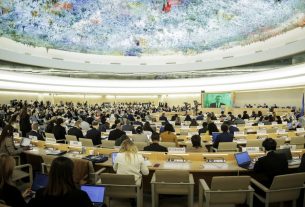Countries will resume negotiations in Geneva on August 5, 2025, on a global plastics treaty. Previous talks have stalled amid deep divisions over key issues. To make the treaty meaningful, countries need to tackle plastic pollution at its source by limiting production, including by phasing out fossil fuels and subsidies.
Each year, more than 400 million tonnes of plastics are produced globally, nearly all made of fossil fuels, a major contributor to the greenhouse gas emissions driving climate change. Petrochemicals, including plastics, are projected to drive more than one-third of the increase in global oil demand by 2030 and nearly half of it by 2050.
Plastics begin with oil and gas extraction, and throughout their use and disposal have significant impacts on human rights and health. In 2024, Human Rights Watch documented that communities living alongside fossil fuel operations in the United States – including those producing the raw chemical materials for plastics – suffer elevated risks and rates of cancer, harm to reproductive and newborn health, and respiratory ailments. These harms disproportionally affect fenceline communities – those close to polluting operations – including communities of color.
Recycling is often framed as the solution, but it too has human rights and health costs. Human Rights Watch found that in Türkiye, residents living near plastic recycling facilities suffer respiratory and skin ailments from pollution and toxins released during recycling. The current draft of the treaty includes language promoting higher recycling rates without accounting for the harm associated with recycling.
Governments have an international legal obligation to protect the human right to a clean, healthy, and sustainable environment. The treaty should include safeguards to protect human rights and health from production through disposal, and recognize that waste management alone will not solve plastic pollution.
Countries have an opportunity to deliver a meaningful treaty that can effectively end plastic pollution. Rights-respecting measures, including production caps and fossil fuel phase-out, are essential to any lasting solution.


